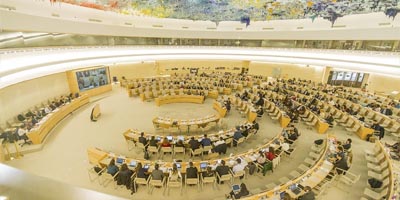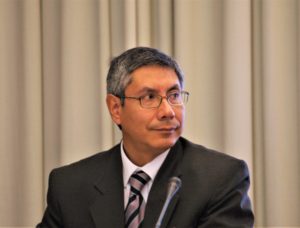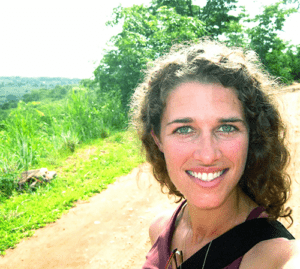Perspectives on the UN’s Zero Draft Treaty by:
• Surya Deva, professor at the School of Law of Hong Kong and current chair of the UN Working Group on Business and Human Rights,
• Carlos Lopez, senior legal adviser at the International Commission of Jurists, and
• Kendyl Salcito, co-founder of the business and human rights research organization NomoGaia.
In July 2014, the Human Rights Council adopted a ground-breaking resolution for the “elaboration of an international legally binding instrument on transnational corporations and other business enterprises with respect to human rights.”
(Cliquez ici pour le video version française.)
This resolution represented a milestone, as it was the first attempt to regulate the operations of businesses at an international scale. It provided for the implementation of an Open-Ended Intergovernmental Working Group (OEIGWG) to draft what may become a new treaty.
The first version – the Zero Draft – was released in July 2018, and the nature of the draft, its scope and content, still triggers controversy.
Scope
The scope of the draft Treaty is a major point of concern. Kendyl Salcito highlights that it is focused on companies that have a transnational character, thus any violation of human rights by domestic or state-owned companies is not covered by the draft.
This concern shared by Carlos Lopez. “I think the scope of the Draft is highly problematic, and especially to achieve what I believe is the main objective of the Treaty: to create a legal liability for business enterprises and provide better access to justice,” he said. “You cannot achieve that by making a distinction between companies that have operations with a transnational character and those who operate only within the domestic market.”
Surya Deva acknowledges that it would be ideal if the instrument applied to all business enterprises, but says that the challenges of regulating transnational corporations are very different, and having an instrument focused on the latter would permit to tackle the very issues specific to this kind of operations. He doubts the Treaty’s potential to gather support if it was to target all business enterprises, arguing that many countries and companies would stop supporting the instrument.
Lopez doesn’t share this concern, saying that debates regarding the scope of the Treaty arise because of an insufficient understanding of the problem. He also argues that many states “are still marked by past debates of two decades in the UN, where the debate around these issues was framed under different conditions. But now we are in a different moment. The mistake around the scope was probably dictated by the circumstances in 2014, but that could be easily solved.” In his view, the problem is that this effort to modify the scope has not yet been undertaken by the leaders of the process.
The UN Guiding Principles
Another major point of concern that was raised is the draft’s lack of consistency with the UN Guiding Principles on Business and Human Rights (UNGPs), a worry that is shared by our three interviewees. Formed in 2011, the Guiding Principles established the ‘Protect, Respect and Remedy’ framework for enhancing standards in addressing the risk of adverse impacts on human rights linked to business activity. The UNGPs set human rights due diligence in a four-step process: assessing actual and potential human rights impacts; integrating and acting on the findings; tracking responses; and communicating about how impacts are addressed.
According to Deva, “the Zero Draft does not follow these steps in the same order: therefore, the instrument for now dilutes what we already have with the UNGPs,” saying that all future instruments should start from that baseline established by the UNGPs. Lopez builds on this point, arguing that it is not about following the UNGPs to the letter, but taking them as a starting point. He says that the approach should not prevent going further or developing these general formulations with more precision, and that the Treaty should be complementary to the UNGPs, not competing.
Preventing harm, and access to remedy
Some critics have argued that the Draft lacks sufficient prevention measures, but Lopez says that the Draft’s focus on access to remedy and justice does not undercut the whole ‘protection and prevention’ component of the text. He points out that the current Article 9 is devoted in its entirety to prevention measures, with standards and obligations related to companies’ human rights due diligence and impact assessment.
“The main motivation for this Treaty was the realisation that access to remedy and justice is exactly what we need now,” he says. “We have lots of preventative tools, such as the UNGPs, but we don’t have something that will fill the gap as to access to justice and remedy”.
Worries were also expressed about the provisions of the future instrument being challenged by other trade and investment agreements. Indeed, international law is structured in such a way that all treaties are equally binding. In that context, is there a concern about the status of any future binding treaty? In Lopez’s view, the matter is not about ensuring the primacy of the Treaty, but the primacy of human rights in general over concerns for trade and investments. Once this is acknowledged, the only issues would only be technical legal considerations to identify overlapping areas.
Can the Treaty drive change?
Finally, the overarching question intrinsic to the treaty process is: will it manage to really drive real change? This is a concern Salcito remains quite gloomy about. “My concern is with implementation,” she says. “I’ve been working in human rights due diligence for over a decade now and, acknowledging that there are differences across countries and contexts, it is not clear to me that we understand what we’d be asking of companies, what we’d be holding them to. I struggle to see how that could affect change on the ground.”
The Draft provides for the creation of a committee of independent experts to monitor the setting up of the Treaty. According to Lopez, the committee has the potential to properly carry out its mandate, and adequate safeguards will be in place to ensure the independency of its experts. In his opinion, this committee will even have an enhanced impact compared to other UN committees, as it will be looking at state practice in relation to companies. Its ability to look at specific situations and name companies will have a big impact on how these companies will behave, although he agrees that a committee is not the best in terms of instrument for enforcement.
Some advocates, such as Anne van Schaik of Friends of the Earth Europe, have indeed called for the creation of an international tribunal dedicated to hearing complaints for those who allege harm from a business enterprise; arguing that only such a tribunal will ensure that victims can be heard. However, Lopez reckons that implementing an international tribunal does not seem possible for now, given that there is no political traction for such a move. He considers a committee of experts to be a good start, with the possibility to consider future improvements about monitoring and oversight.
Moreover, Deva points out that the Draft provides for the possibility of civil society to participate in the process, which strengthens the Treaty’s potential to drive change on the ground. Regarding criticism about the Treaty’s potential to really change the situation on the ground, he says, “Implementation of international human rights law is a major challenge, not just in the field of business and human rights but generally. The question is how do we improve on that? If it is ineffective, the burden is on us to explore innovative tools to make it more effective.”
Amongst those tools, Deva points to the capacity of non-state actors to enforce the Treaty. He thus calls for leveraging the power of civil society actors, human rights defenders, the media, and others, to implement international law in a different setting, and the benefits of increased cooperation between stakeholders, including states, companies, civil society and international organizations. But how to foster this greater collaboration? He suggests it could be encouraged by the Treaty, for instance through setting the framework for this collaborative structure.
Business perspectives
Lastly, what about businesses’ standpoint regarding the draft process? The US Council for International Business declined an interview invitation for this article, and referred to the joint business response to the Treaty process of the International Chamber of Commerce (ICC), the International Organisation of Employers (IOE), Business Europe and the Business and Industry Advisory Committee (BIAC) of the OECD.
To put it in a nutshell, the business community does not support the Draft. The main points of criticism go as follows:
Business representatives reproach the Draft for diverging with the UNGPs, through opting for a narrower scope that excludes national companies and not following the four-step approach of human rights due diligence. This criticism is shared by many human rights advocates and our three interviewees.
Second, they advance that the Draft does not respect national sovereignty, by expanding the application of extra-territorial jurisdiction instead of encouraging states to address human rights challenges in their own jurisdiction.
Third, they argue that the Draft will harm countries’ investments and development, with a punitive approach that may disincentivize foreign direct investment. Consequently, the document states that the Draft “does not provide a sound basis for a possible future standard on business and human rights.”
To Deva, most of these criticisms are an excuse to oppose a binding instrument that some do not want to see implemented. “The [business] opposition is to the very nature of having a binding instrument,” he says. Lopez agrees. “The opponents are dedicated to oppose it for whatever reason, rather than taking proactive steps to solve the problems.”
Next steps
Both Deva and Lopez agree that although the Draft needs several improvements, it is a good starting point from which stakeholders can negotiate. Lopez notes that the general orientation of the Draft goes in the right direction and makes its purpose clear – to enhance the capacity of people affected by operations of business enterprises to have access to justice.
To them, the Draft has the potential to advance human rights in business operations. It sets clear international standards for companies to enhance transparency and report more publicly and periodically on their practices in relation to human rights. What’s more, the Draft provides for the creation an independent committee to monitor the latter. This would help public and external accountability, Lopez notes.
“There are two real holdups to moving business and human rights forward, Salcito says. “One is opacity, the lack of transparency around human rights due diligence and two, who is driving the conversation and to what ends. So there is a real demand for an independent entity like a working group to be driving the business and human rights agenda, because when companies are driving it themselves, it is very hard to incentivize a company to publish a report it commissions that identifies human rights impacts. There needs to be something external that drives change. And whether a treaty can do that is hard to say, but certainly more transparency around what kind of due diligence is being done and what change it drives on the ground would make a big, short-term difference.”
Deva emphasized the need to have continuous engagement between sessions of the working group, so that stakeholders can find common ground for building broad consensus on the text. Among the improvements that should be made, he mentioned the need for revisions and updates. The Draft also needs more consistency with the UNGPs, so as to become a tool to implement them.
Lopez goes a bit further in detailing his hopes for the next session of the working group, to take place in October 2019. In his view, the main area of improvement revolves around the technical drafting of the different provisions, in particular to avoid some repetitions and generalities. He says there is a need to work on the scope of the Treaty, and to mainstream the key chapters with relation to prevention, remedy and legal accountability. The rest, he argues, are just generalities that can easily be fixed.
Deva says that it is obvious that a treaty alone will not solve all business-related human rights issues. Instead, he insists on the necessity to combine different instruments, both hard and soft, to address these issues. Here, binding rules are needed to regulate the activities of companies to complement the soft instruments in place.
Finally, Salcito notes that rightsholders should be at the center of the discussion about human rights, an absolute must that is too often forgotten when treaties are between governments.
Article, video and interviews with Surya Deva and Carlos Lopez by Alix Blanchard; interview with Kendyl Salcito by Sydnee Novack






